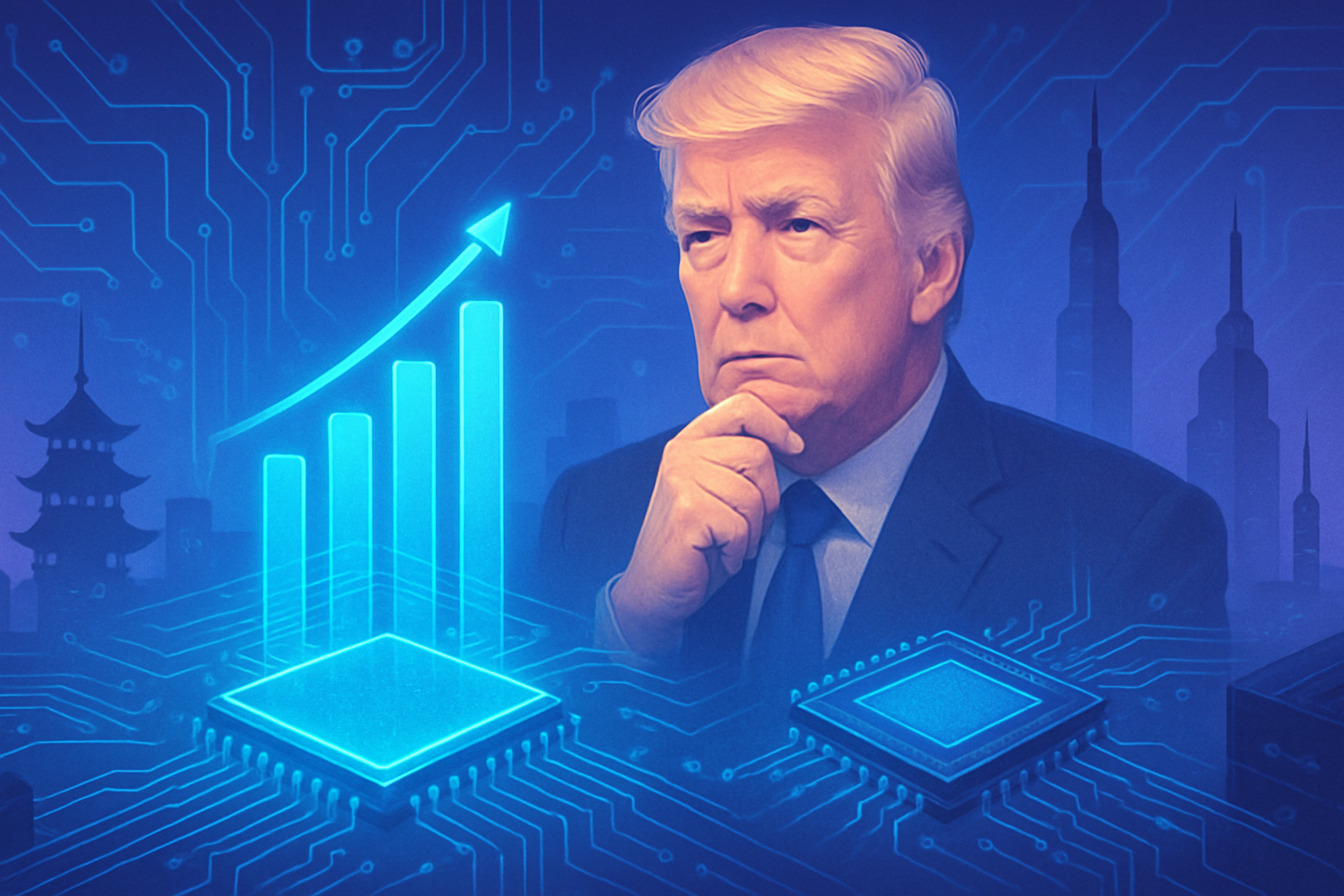Donald Trump envisions allowing Nvidia to sell advanced chips in China. This move could disrupt the global technology landscape. The economic and geopolitical implications of such an agreement are substantial.
The decision promises to influence trade relations between the United States and China. The president seeks to maximize revenues while navigating turbulent diplomatic waters.
Nvidia, subject to export restrictions, could finally unlock lucrative access to the Chinese market. The question of national security remains central, and criticism is rising against this initiative deemed absurd.
Negotiations on advanced chips
President Donald Trump recently hinted that he could allow Nvidia to sell advanced artificial intelligence chips in China. This announcement came after Trump confirmed that he had “negotiated a small deal” aimed at granting his administration a share of the revenues from the company’s sales in the country. An unprecedented aspect of this agreement stipulates that the United States will receive 15% of Nvidia’s revenue generated from the sale of its H20 processor in China.
This H20, designed to comply with the semiconductor control standards set under the Biden administration, is based on an older architecture of the company. Meanwhile, AMD, another chip manufacturer, would also be subjected to this same revenue percentage for its MI308 chip sales. Furthermore, Trump has expressed his intention to discuss a new agreement with CEO Jensen Huang to allow the sale of newer Blackwell models for China. This initiative could unlock billions in sales for Nvidia, which has been pushing for better access to the Chinese market for years, despite concerns about national security in Washington.
Adverse reactions and security concerns
The prospect of this agreement has sparked surprise and outrage among political opponents. Experts, such as Liza Tobin, a former member of the National Security Council, emphasize that this event could be seen in Beijing as a victory. Tobin stated that “Beijing must be thrilled to see Washington turning export licenses into revenue streams.”
Republican lawmakers, such as John Moolenaar, chair of the China committee in the House, have voiced their concerns. Moolenaar stressed that “export controls are a vital defense for our national security, and we must not encourage sales licenses that enhance China’s AI capabilities.” Sources indicate that some national security officials are even contemplating resigning due to the signals Trump is sending regarding advanced technology.
Extension of a trade truce
Trump has also extended a truce in his trade war with China for an additional 90 days, approaching the deadline for the increase in tariffs. The president made this decision just before the deadline, attempting to initiate negotiations that could lead to a summit with Chinese leader Xi Jinping.
The new relations between Islamabad and Washington
Meanwhile, unexpected relations are forming between the United States and Pakistan. The Trump administration had previously criticized Islamabad, accusing it of lying. However, a rapprochement seems to be emerging this year as New Delhi faces sanctions from Trump. The Pakistani diplomatic approach relies on cooperation in the fight against terrorism as well as trade negotiations, particularly in the energy and critical minerals sectors.
Asim Munir, chief of staff of the Pakistani army, plays a fundamental role in this strategy, cultivating relations with influential figures in Washington. Munir even shared a two-hour private lunch with Trump, offering his country a position as a trusted intermediary between the United States and adversaries like Iran and China.
Economic consequences
American companies are already feeling the impact of the new trade policies. Small businesses are raising their prices in response to imposed tariffs, signaling imminent inflation for consumers. Ongoing trade tensions will continue to affect the American economy while complicating international communications.
Trump has also appointed EJ Antoni, a right-wing ally, to lead the Bureau of Labor Statistics, which could influence the reported economic measures. European heads of state are urging Washington to intensify sanctions pressure on Russia before Trump meets with President Vladimir Putin in Alaska this week.
The situation continues to evolve, reflecting unexpected alliances on the international stage and the complex ramifications of decisions made by the White House.
Frequently asked questions about Donald Trump’s sale of Nvidia chips in China
Why is Donald Trump considering allowing Nvidia to sell advanced chips in China?
Donald Trump wants to negotiate a deal that would allow Nvidia to sell advanced chips in China to increase U.S. revenues, capitalizing on sales in this rapidly expanding market.
What percentage of Nvidia’s revenues will be shared with the United States?
Under the proposed agreement, the United States would receive 15% of the revenues generated by Nvidia’s H20 processor sales in China.
What impact could this have on U.S. national security?
This agreement raises concerns among some national security officials, as it could allow China to access advanced technologies that would enhance its AI capabilities.
Is AMD involved in this agreement?
Yes, AMD is also involved, as it plans to share 15% of its revenues from its MI308 chip sales in China as part of this agreement.
How are Trump’s allies reacting to this potential decision?
Trump’s allies, especially within the Republican Party, express concerns that this could weaken the necessary export controls to protect national security.
What companies are affected by this decision besides Nvidia and AMD?
Currently, Nvidia and AMD are the primary companies mentioned in this agreement, but other companies in the tech sector could also be affected if a precedent is set.
What is the future of U.S.-China relations following this agreement?
This agreement could open the door to future collaborations, but it could also exacerbate existing tensions regarding technology and trade.
What are the risks associated with selling advanced technologies to China?
The main risks include the transfer of knowledge that could enhance China’s military and technological capabilities, which could potentially harm U.S. interests and those of its allies.
How has the public reacted to this potential announcement?
The public reaction is mixed, with concerns about national security and criticism from political opponents, but also hopes for economic growth.
What are the possible consequences of implementing this agreement for Nvidia?
If the agreement materializes, Nvidia could potentially realize billion dollars in sales in China, although this may also lead to increased national scrutiny of its activities.






